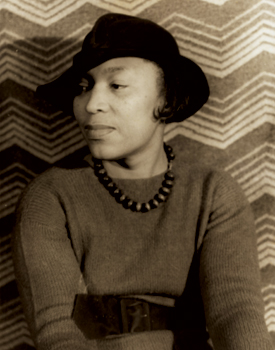
In the early ’40s, Zora Neale Hurston was at the peak of her career, a celebrated novelist and Hollywood script consultant. Eight years later, she was working as a maid on Miami Beach.
In the last few years of her life, broke and ailing African-American folklorist, anthropologist and novelist Zora Neale Hurston, once one of America’s most celebrated literary figures, went almost unnoticed. Fired as a librarian at Patrick Air Force Base, she left Eau Gallie, a $5-a-week rental cottage, a bird bath and a dog named Spot and arrived in Fort Pierce in 1957 in a beat-up Willys station wagon, with a typewriter that she would later pawn for groceries. She became one of the nameless people fishing for mullet with a cane pole in the Indian River Lagoon, once describing its bioluminescence, used today by Harbor Branch marine biologists to measure pollution levels, as “scintillating like every brilliant jewel you can imagine.”
It was the day of Buddy Holly and Howdy Doody, poodle skirts and saddle shoes, when AM radio stations in the South played Fats Domino’s I’m Walking only after it was recorded by Ricky Nelson. Power tools were new. So was Birds Eye Concentrated orange juice. Just a few years back, the state coordinator of the NAACP had been murdered in Mims, a small community north of Titusville, and only a few years later, Martin Luther King would spend the night in jail in St. Augustine for leading a demonstration against restaurants and hotels. There were no black clerical office workers in either St. Lucie County or any state or federal office, and the Civil Rights Act of that year, a warning shot fired across the bow of the Treasure Coast, caused folks in Indian River County to notice segregated schools, water fountains, public toilets, beaches, lunch counters, even cemeteries, the way you might suddenly pay attention to an unsecured shutter banging in the wind.
Few knew that Hurston, weighing more than 200 pounds, eccentric and unkempt in a community that prided itself on personal grooming, was the author of prize-winning works such as Their Eyes Were Watching God, Jonah’s Gourd Vine or Dust Tracks On A Road, or even more abstruse, that this oddball stranger suffering from hypertension, swollen legs and frequent bouts of gastric disorders had once been described by noted author Marjory Kinnan Rawlings as “lush and fine looking,” or that she had been the protégé of Dr. Franz Boas, considered the father of anthropology.
Read the entire article in the March 2012 issue









 True Tails is a series written by Amy Robinson for Vero Beach’s dog lovers. Ask Amy about your dog’s behavior by clicking below.
True Tails is a series written by Amy Robinson for Vero Beach’s dog lovers. Ask Amy about your dog’s behavior by clicking below.
Facebook Comments